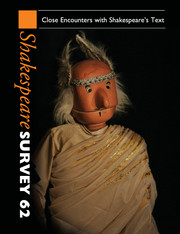Book contents
- Frontmatter
- Shakespeare, text and paratext
- The popularity of Shakespeare in print
- The continuing importance of new Bibliographical method
- ‘Honour the real thing’: Shakespeare, Trauma and Titus Andronicus in South Africa
- ‘O, these encounterers’: on Shakespeare’s meetings and partings
- A play of modals: Grammar and potential action in early Shakespeare
- Merry, marry, Mary: Shakespearian wordplay and Twelfth Night
- A subtle point: Sleeves, tents and ‘Ariachne’s broken woof’ (again)
- The look of Othello
- Red button Shakespeare
- ‘Mark you / his absolute shall?’: Multitudinous tongues and contested words in Coriolanus
- Chagall’s Tempest: An autobiographical reading
- Reading illustrated editions: Methodology and the limits of interpretation
- Close encounters with Anne Brontë's Shakespeare
- Shakespeare and the magic lantern
- Shakespeare and the coconuts: close encounters in post-apartheid South Africa
- The Schrödinger effect: Reading and misreading performance
- Behind the scenes
- Inner monologues: Realist acting and/as Shakespearian performance text
- More japanized, casual and transgender shakespeares
- Translation futures: Shakespearians and the foreign text
- After translation
- ‘The single and peculiar life’: Hamlet’s heart and the early modern subject
- Mapping King Lear
- ‘Last on the stage’: The place of Shakespeare in Charles Darwin’s ethology
- Sense/memory/sense-memory: Reading narratives of Shakespearian rehearsals
- Shakespeare performances in England (and Wales), 2008
- Professional Shakespeare productions in the British Isles, January–December 2007
- The Year's Contributions to Shakespearian Study 1 Critical Studies
- 2 Shakespeare in performance
- 3a Editions and textual studies
- 3b Editions and textual studies
- Index to Volume 62
3a - Editions and textual studies
Published online by Cambridge University Press: 28 November 2009
- Frontmatter
- Shakespeare, text and paratext
- The popularity of Shakespeare in print
- The continuing importance of new Bibliographical method
- ‘Honour the real thing’: Shakespeare, Trauma and Titus Andronicus in South Africa
- ‘O, these encounterers’: on Shakespeare’s meetings and partings
- A play of modals: Grammar and potential action in early Shakespeare
- Merry, marry, Mary: Shakespearian wordplay and Twelfth Night
- A subtle point: Sleeves, tents and ‘Ariachne’s broken woof’ (again)
- The look of Othello
- Red button Shakespeare
- ‘Mark you / his absolute shall?’: Multitudinous tongues and contested words in Coriolanus
- Chagall’s Tempest: An autobiographical reading
- Reading illustrated editions: Methodology and the limits of interpretation
- Close encounters with Anne Brontë's Shakespeare
- Shakespeare and the magic lantern
- Shakespeare and the coconuts: close encounters in post-apartheid South Africa
- The Schrödinger effect: Reading and misreading performance
- Behind the scenes
- Inner monologues: Realist acting and/as Shakespearian performance text
- More japanized, casual and transgender shakespeares
- Translation futures: Shakespearians and the foreign text
- After translation
- ‘The single and peculiar life’: Hamlet’s heart and the early modern subject
- Mapping King Lear
- ‘Last on the stage’: The place of Shakespeare in Charles Darwin’s ethology
- Sense/memory/sense-memory: Reading narratives of Shakespearian rehearsals
- Shakespeare performances in England (and Wales), 2008
- Professional Shakespeare productions in the British Isles, January–December 2007
- The Year's Contributions to Shakespearian Study 1 Critical Studies
- 2 Shakespeare in performance
- 3a Editions and textual studies
- 3b Editions and textual studies
- Index to Volume 62
Summary
EDITIONS
The programme note is an undervalued genre. Although the programmes sold in the lobbies at major Shakespearian productions often include superbly incisive accounts of the play and its reception history, usually written by a prominent figure in the profession, they are virtually never cited in scholarly discourse. So it comes as a pleasant surprise to find programme notes given pride of place in Roger Warren’s new Oxford edition of The Two Gentlemen of Verona. Warren begins his introductory essay by quoting at length from Hilary Spurling’s description of the world of the play in her programme note for a 1970 RSC production. The next section of the introduction similarly opens by citing Anne Barton’s programme note for her husband’s 1981 production, in which she defines the central topic of the play as ‘how to bring love and friendship into a constructive and mutually enhancing relationship’.
Warren’s unconventional use of programme notes is one of the features that distinguishes this edition as the work of a man of the theatre. Whereas the ‘stage history’ in many editions can be a tired distillation of previous reviewers’ accounts,Warren’s descriptions of productions over the last forty-odd years draw extensively on his firsthand experience. Warren does not suffer bad acting gladly. He witheringly characterizes the BBC Television version of the play as a ‘vilely spoken’ production in which ‘few of the actors know how to speak verse – the main fault is to stress personal pronouns when the text doesn’t’. When Warren’s recollection of a given production differs from that in a published review, he attempts to adjudicate the discrepancy by tracking down the original players. In reviewing Robin Phillips’s 1970 production of the play, Robert Smallwood reported seeing ‘a little enigmatic flicker of a smile’ on the face of the actor playing Proteus, Finbar Lynch, before he began to speak his crucial lines in the final scene. Warren, however, ‘recalled a clenching of the mouth that spoke of inner tension, even resentment’, and so asked Lynch ‘to cast his mind back fifteen years to that moment’. Lynch reported that ‘both he and his director believed that Proteus’ repentance was genuine’.
- Type
- Chapter
- Information
- Shakespeare Survey , pp. 421 - 426Publisher: Cambridge University PressPrint publication year: 2009



